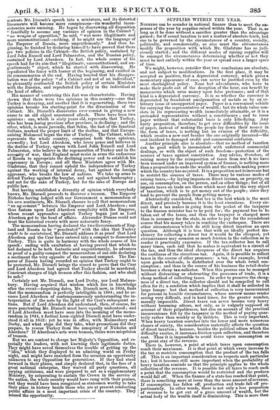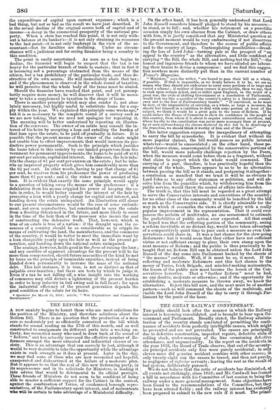SUPPLIES WITHIN THE YEAR.
NOTHING can be sounder in national finance than to meet the ex- penses of the year by supplies raised within the year. That is, so long as it be done without a sacrifice greater than the advantage gained ; for if sound taxation is not a matter of absolute truth, but one to be governed by the circumstances of a country, socially, politically, and commercially, so also must the circumstances modify the proposition with which Mr. Gladstone has so judi- ciously started ; and the different modes of raising supplies will be amongst the circumstances determining whether or not they must be met entirely within the year or spread over a larger space of time.
We might, however, consider that two conclusions are absolute, and not subject to modifications. In the first place, it may be accepted as positive, that a depreciated currency, which gives a momentary appearance of ease, can never be justified even by the most shortsighted policy. None but adventurers, who have to make their profit out of the deception of the hour, can benefit by manceuvres which raise money upon false pretences; and of that kind is a depreciated currency. It is so whether the currency is depreciated by fraudulent amalgamation of metals or by an ar- bitrary issue of unsupported paper. Paper is a convenient vehicle for carrying the representative of wealth ; but its whole value con- sists in its representing wealth immediately attainable, or it is a pretended representative without a constituency ; and to issue paper without that substantial basis is only kite-flying. Any hasty proposition, therefore; to get over difficulties by the issue of paper, instead of making the people lay down their money in the form of taxes, is nothing but an evasion of the difficulty, which creates a new cost besides the one originally incurred—the cost incident to damaged credit and commercial confusion. Another principle also is absolute—that no method of taxation can be good which is inconsistent with unfettered commercial dealings, or with the object of such freedom—protection of the sources of taxes against constriction. Any advice, therefore, of raising money by the reimposition of taxes from wnh we have been rescued under an improved system of finance, is nothing more than a proposition to undo the wealth and the wealth-making power which the country has aegluired. It is a proposition not to increase but to restrict the sources of taxes. There may be various modes of raising taxes,—by laying imposts on direct income, on property, on use, on consumption, on the person, and on other things ; but of all imposts taxes on trade are those which most defeat the very object of taxation, which is to get money out of the people; since they tend to prevent the people from getting money. Abstractedly considered, that tax is the best which is the most direct, and precisely because it is the least circuitous. Every cir- cuit that a tax makes in going from the pocket of the taxpayer to the finance minister has to be paid for ; the payment has to be taken out of the taxes, and thus the taxpayer is charged more than is necessary for the state, in order to pay for the roundabout course that his money takes in reaching the exchequer. There are other circumstances which do still keep direct taxation an open question. Although it is true that with an ideally perfect ma- chinery for collecting a direct tax it would be the cheapest, yet circumstances may occasion so much friction in the collection as to render it practically expensive. If the tax-collector has to call many times, each call that he makes is equivalent to a circuit of the tax, and thus the ideal cheapness of the direct tax acquires the costliness of the circuitous tax. Again, it is possible to collect taxes in the course of other processes: a tax, for example, levied upon goods wholesale, is distributed over the whole retail con- sumption; and thus in the course of his business the retail-dealer becomes a cheap tax-eollector. When this process can be managed without distracting or obstructing the processes of trade, it is a cheap method of collecting taxes. In order to preserve the cheap- ness of a direct tax, the collector should not be compelled to call often for it; a condition which implies that it shall be collected in large lumps : but that method of collection is very inconvenient for persons in humble circumstances, whose narrow means render saving very difficult, and in hard times, for the greater number, morally impossible. Direct taxes can never become very heavy without becoming odious, not only, as is vulgarly supposed on account of their palpableness, but also on account ot the practical inconvenience felt by the taxpayer in the method of paying quar- terly rather than weekly or by driblets. This is very important. When heavy taxation searches into the lower and more numerous classes of society, the consideration materially affects the question of direct taxation ; because, besides the political odium which the difficulty excites, it increases friction upon collection, and therefore cost. Thus it is impossible to avoid taxes upon consumption as the great stay of the revenue. There is, however, a point at which taxes upon consumption reach their maximum. It is that point at which every increase to the tax so restricts consumption that the product of the tax falls off. This is an important consideration as respects each particular tax ; but it becomes still more important when the probability of heavy taxation reminds us that the principle applies to the whole collection of the revenue. It is possible for all taxes to reach such a point that the consumption would be restricted and the produce would fall off. When the finance of a state has reached that point, there is something more at issue than the mere amount of revenue. If consumption has fallen off, production and trade fall off pro- portionately. In other words, there is not only a less proportion of revenue to be got out of a gross amount of wealth, but the actual body of the wealth itself is diminishing. This is more than the expenditure of capital upon current expenses ; which is a bad thing, but not so bad as the result we have just described. It is the actual decline of the original source both of capital and of income—a decay in the commercial prosperity of the national pro- perty. When a state has reached this point, it is not only with- out a balance at its banker's—it is not only straining its resources to the last point—it is not only bankrupt in the view of the ac- countant—but its faculties are declining. Under no circum- stances,will a judicious and far-seeing financier bring a country to this condition.
The point is easily ascertained. As soon as a tax begins to decline, the financier will begin to suspect that the tax is too heavy for the particular branch of trade to sustain; that in fact it is becoming not a percentage abstracted from the means of the citizen, but a tax prohibitory of the particular trade, and thus de- structive of its own source. He will immediately abate that tax ; and if the phenomenon is observed in the whole round of taxation, he will perceive that the whole body of the taxes must be abated.
Should the financier have reached that point, and yet peremp- torily require more money, he will discover that it will be neces- Ba to take a supplement to taxation in the shape of loans. rihere is another principle which may also render it, not abso- lutely necessary, but highly useful to substitute loans for a sup- ply within the year. We explained this principle some weeks ago,* but it is so necessary to the complete round of a survey such as we are now taking, that we need not apologize for repeating it. The meaning will be better understood by repeating an illustra- tion of the converse. The owner of an estate may consult the in- terest of his heirs by accepting a loan and entailing the burden of that loan upon the estate, to be paid off gradually in future. It is possible that the present means of the owner of the estate might not enable him to effect improvements that would increase its pro- ductive power permanently. Such is the principle which justifies the loans taken in this country by our landed proprietors from Go- vernment for permanent improvements, the loans to be paid off at 61 per cent per annum, capital and interest. In this case, the heir inhe- rits the charge of 61 per cent per annum on. the estate ; but he inhe- rits an improved property which gives him considerably more than the 6; per cent. In other words, having to pay that charge of 6 per cent, he receives from his predecessor the power of producing more than 61 per cent ; and is the richer man on account of the Joan. It is evident that exactly the same principle would apply to a question of taking away the means of the predecessor : if a defalcation from his means crippled his power of keeping the es- tate in order, he would better consult the interest of the heir by procuring a loan with a yearly charge for capital and interest, and handing down the estate unimpaired. An illustration still closer to our present circumstances would be the case of some embank- ment, not even reproductive, but constructed to save the estate from a flooding threatened in the future, and more likely to occur in the time of the heir than of the possessor who incurs the cost of constructing the defensive work. That, however, which is tame of an estate is true of a nation : if the draught upon there- sources of a country should be so considerable as to cripple its means of cultivating the land, the manufactures, and the commerce of the country, it would be better to meet the immediate want by a loan chargeable yearly upon the heir as well as the present ge- neration, and handing down the national estate unimpaired.
The analogy, however, holds good in the form of raising the loan ; and any sacrifice of apparent advantage for the present will be far more than compensated, should future necessities of the kind be met by loans on the principle of terminable annuities, instead of being handed down permanently to increase the mass of the national debt. This last instance, it is true, is not so distinct as that of palpable over-taxation ; but there are tests by which to judge it. Even if a tax be not falling off, a wise insight into the working of commerce may still dictate a lightening of the present burden in order to keep industry in full swing and in full heart; for upon the industrial efficiency of the present generation depends the good condition of the estate for its heirs.
• apectator for March 11, 1834; article, " War Expenditure and Commercial Development."



























 Previous page
Previous page